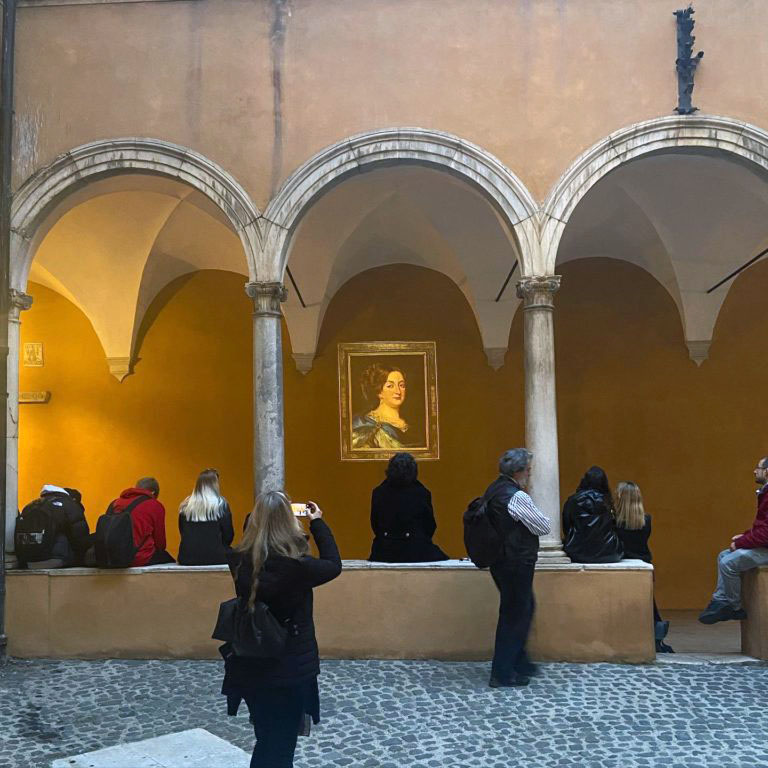
The 3rd edition of Human Landscapes (Nov. 21-27, 2022) concluded by remembering Paolo Ramundo at Monte Mario: leaving the threshing floor at sunset and screening, walking among the mulberry trees, Silvio Montanaro’s docufilm, The Bird that Cultivated the Land.
Paolo Ramundo was a pivotal figure in the revolutionary struggles in Rome in the 1970s and before that in ’68 with the Birds. Paul’s voice is heard in the dark, and upon arriving in the silo-cum-think tank (where a permanent sign has him “speaking” through geo-podcasts), we retrace Ramundo’s epic, who in 1977, occupying the land abandoned by the S. Maria della Pietà then found himself taking in former internees. He thus created inclusive conditions that supported the courageous Basaglia law that closed the Asylums to open the Society. And help give birth to Social Farming.
Paolo Ramundo often spoke about Nathan, considering him the most important mayor of Rome. That is why this project on Rome’s “deities” was inaugurated, remembering him, talking about the relationship between citizenship and education, opening the day with Lorenzo Cantatore, director of MUSED, on the street, on Piazza della Repubblica, experiencing the city as a classroom. The Museum of Education was explored, with Fridanna Maricchiolo and her students from Scienze Della Formazione-Università degli Studi Roma Tre, reconstructing the story of Mayor Nathan and the Garibaldians of the alphabet. In that exhibit, the extraordinary history of the Ente scuole per i contadini dell’Agro romano emerges with documents, photos and furnishings testifying to the literacy activities initiated in the early 20th century by an extraordinary group of intellectuals, hygienists, scientists, artists and literati: Sibilla Aleramo, Angelo Celli, Giovanni Cena, Duilio Cambellotti and Alessandro Marcucci. They called them the “garibaldini of the alphabet” revealing how that of education was a real war of liberation from ignorance, poverty and disease.
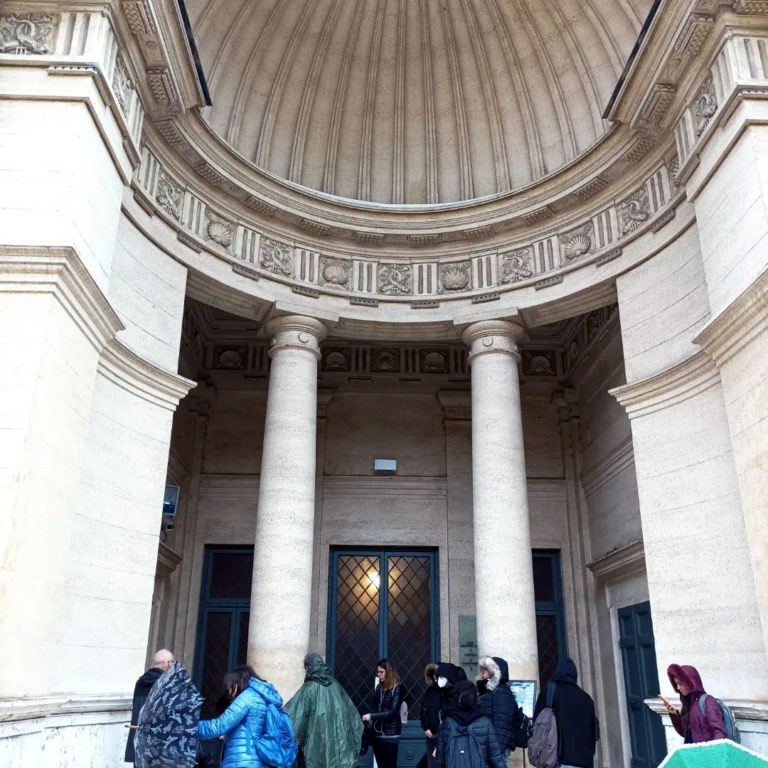
On Tuesday we went to the Esquiline, again with Roma3 students, in an area of extraordinary density, outside the Servian Walls (that es, implies what outside, outside living, somewhat the opposite of “tenant”) because of access to the city, a condition that the Piedmontese with the Unification of Italy made explicit by creating in Piazza Vittorio a real directional center to welcome the new citizens of the Capital just landed from Termini station a few steps away. The Esquilino is thus a borderland, since time immemorial. One stands in the rain, sheltering at the Aquarium Theater, now the House of Architecture.
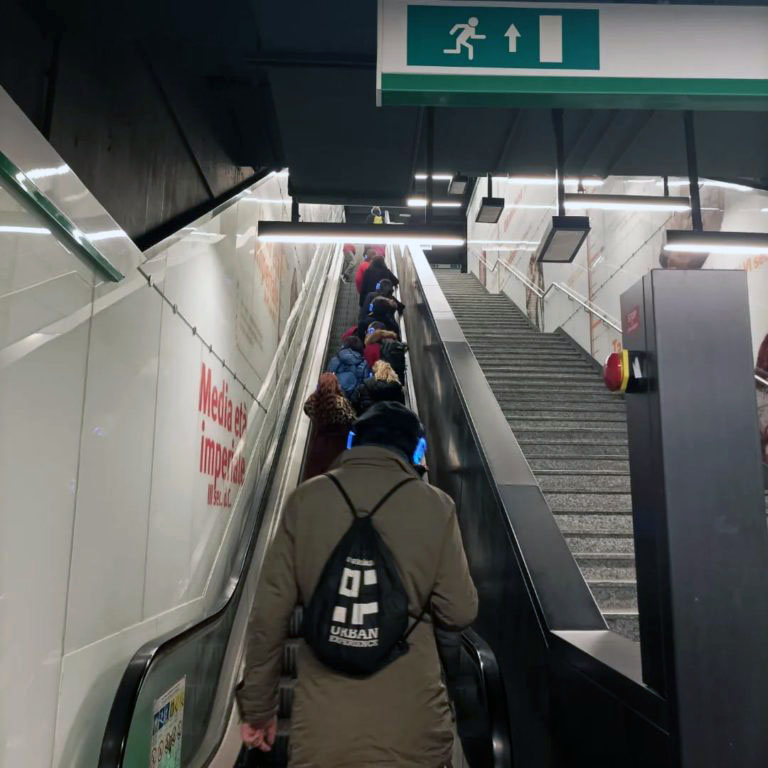
In the afternoon we started from the Academy of Fine Arts in Tordinona remembering another aspect of Paolo Ramundo who animated in the 1970s the struggle for housing in that “periphery” in the historic center, traces of which remain in the mural Asino che Vola (Donkey that Flies). Years later he designed with architecture students an Oculus to restore the lost relationship with the Tiber. Tordinona for centuries was a place with a high density of craftsmanship, with excellences such as that of the noble artisan tradition of the Roman School of Goldsmiths and Silversmiths, which found its zenith in the seventeenth-century Baroque. The focus of the walkabout is therefore the architectural project by Paolo Ramundo and Nanni Morabito, of Oculus to make a tunnel under the LungoTevere in Tor Di Nona. There they envision the creation of a “breach” in the wall body of the embankments, for the recovery of the historic riverfront. The direction of the tunnel, inclined with respect to the road by about 40 degrees, would take up the orientation of the ancient Roman pier found during work on the construction of the embankments. This Oculus proposal was considered (by the previous city council) in the Urban Regeneration plan for that area, also based on the revitalization of artisan activities with the allocation of premises, with the commitment of the Department of Productive Activities.
On Wednesday, an event, partly already held in September, was relaunched at Teatro Argentina (see video here). The small room of the TOMO Café Bookshop in San Lorenzo immediately crowded for the talk on “Performing Media to Distill Human Landscapes” With Gaia Riposati and Massimo Di Leo, authors of the book-book “Performing Media, a Remote Future. Carlo Infante’s Path Between Avant-Garde Memory and Digital Transition” along with Renato Cuocolo and Roberta Bosetti authors of “Underground.” It concludes in the walkabout “Meta Hodos (method): through the path, knowing by walking among human landscapes.”
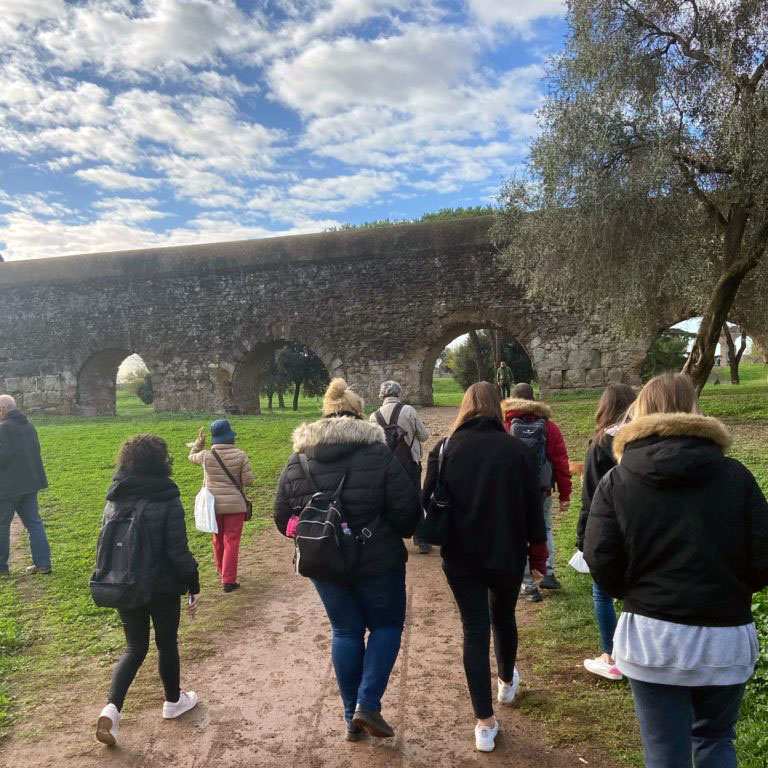
On Thursday we once again retraced the story of Don Sardelli, the “Don Milani of the Aqueduct” whose podcasts distilled and published on Loquis were played, creating a de facto restitution in the cloud of our many explorations That pedagogue priest in the 1960s, in the wake of Don Milani and the School of Barbiana, created the conditions for emancipating an urban settlement crowded under the aqueducts, starting with the schooling of the boys who lived in the shacks. We listened to the voices of the protagonists (including the boys from his school) walking along the Acquedotto Felice, mapping with geopodcasts those stories inscribed in geographies.
In the afternoon it is “Sixtus V, Raphael Fabretti and Christina of Sweden. Three portraits made performant with Artificial Intelligence” with NuvolaProject and students from the Department of Planning Design and Architecture Technology of Sapienza University of Rome
Arriving in the cloister of San Salvatore in Lauro, digital performing media artifacts created (over the course of previous editions of Human Landscapes) with Artificial Intelligence systems by Nuvola Project (with work far more subtle than the deep fake effect, through actor morphing) of the portrait of the “Queen of Rome” (as Christina of Sweden was recognized by the Roman people) and the talking pictures of Sixtus V and Raffaele Fabretti are projected. In the radionomade conversation, among the various participants actively involved in the congenial confrontation that connotes us, Giorgio Fabretti, a descendant of Monsignor Fabretti, is the protagonist (with a phone call) in pointing out the Celtic matrix that characterizes the prammaciousness of the Marche, an imprint given by Sixtus V, er papa tosto, during his years of papacy (1585-1590) . Nuvola Project also had the postcards used with talking portraits that turn out to be markers to activate augmented reality apps.
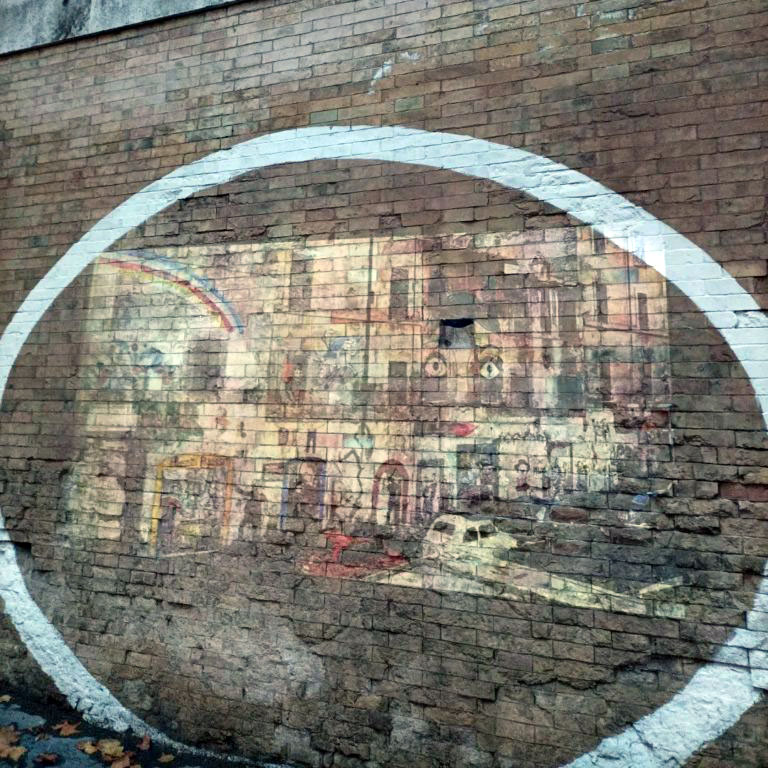
On Friday there was action at the Antiquarium Lucrezia Romana Parco Archeologico dell’Appia Antica with director Simone Quilici with whom we put up a sign that refers to NuvolaProject’s digital animation (with artificial intelligence) of Cranach’s portrait of Lucretia speaking Shakespeare’s words.
The cruel story is that of Lucretia, wife of Collatinus, whose story of her suicide after being raped by the son of Tarquinius the Proud is evoked. This happens through the verses dedicated to him by William Shakespeare, in a poem that made famous (although few people know about it today) that sacrifice that in the fifth century B.C. determined the revolt of the Romans against the Etruscan king for which the Republic was born.
The viewers of Cuocolo Bosetti’s “Underground.Roberta in the Subway” are not only those in headphones but everyone else who crosses that absorbed swarm. This is one of the pivotal aspects of the theatrical happening for the 3rd edition Human Landscapes that replicates twice in the MetroC of St. John’s. It is a public gesture that changes perception: it shows how theater happens inside and not just outside. One is in Roberta’s head as one goes on that beautiful automatic Metro C that in the descent makes us understand, meter x meter, how Rome is built in layers (meters are associated with centuries). One is immersed in a “theater outside the theater” that reveals to us how simple, and complex at the same time, it is to find oneself being the protagonist of an incidental action. One follows it like dioscuri, shielding it in its urban drift into subway, under, underground. And one goes to think of those who made this word an emblem of cultural otherness: Marcel Duchamp, who in 1961 thus defined the practices of new dada. One is part of the art-life short-circuit, as well as those hundreds of unwitting viewers who on their way home for dinner will be able to say that they found themselves witnessing a strange lucid dream.
Listen to radiowalkabout
https://www.geoblog.it/tag/paesaggiumani-2022/
The Rome Central – Italy in the world editorial staff consists of freelance editors, journalists, photographers, filmmakers, doctors, writers, video-makers, supporters, poets, writers, actors, singers and many friends.
RomeCentral is a Magazine completely no-profit , whoever writes in this magazine does his job without any commercial pressure.
NB: No people in Rome Central, from managers to employees etc .., receive any type of compensation.
The love for the free journalism repays all our efforts.
